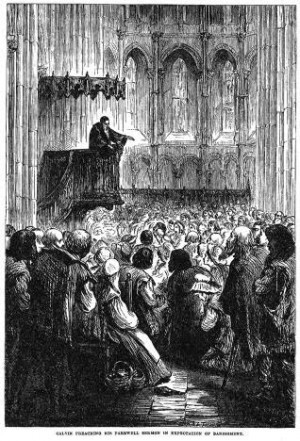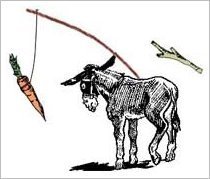Justin Taylor's Blog, page 259
December 6, 2011
The Law of Four C's: Chaos, Community, Conscience, and Cops

Colson's Law is named for the man I learned it from: Chuck Colson, founder of Prison Fellowship Ministries. It is one of the fundamental laws of human history. It has always been true, and it always will be true, unless human nature itself changes in its very essence. It is the law of four "C's": Chaos, Community, Conscience, and Cops.
Colson's Law can be remembered best visually, like the "square of opposition" in logic.
Community and chaos are "vertical" opposites, good versus evil, while cops and conscience are "horizontal" opposites, two goods to be balanced. Community and chaos are inherently opposed forces, like battling armies.
Cops and conscience are the two possible weapons of the defensive army (community) against the offensive army (chaos).
Both pairs of opposites are inversely proportionate, but the two vertical opposites are necessarily opposed (chaos and community destroy each other), while the horizontal ones are not (in fact, cops and conscience are often complementary).
But the need for each one decreases as the supply of the other increases: The more conscience a community has, the fewer cops it needs, and the more cops it has, the less conscience it needs to rely on.
An application:
The paradox of democracy is that it is founded on the premise of strong consciences but tends to produce weak ones by its very permissiveness. Its maximization of freedom (freedom from cops) rests on the willing submission of its citizens to conscience; yet this very freedom from cops tempts us to free ourselves from conscience, too. Paradoxically, this excess of freedom, or rather this mistaken kind of freedom, requires more cops to stave off chaos, thus resulting in less freedom. (For the two kinds of freedom — freedom from conscience and freedom from cops—are also inversely proportionate).
Colson's Law states that the only alternatives to conscience are cops or chaos. If the inner shield of a community is lowered, the outer shield must be raised to stave off chaos. Therefore, a community, especially a free democracy, that loses its conscience will necessarily become a police state.
The idea of America becoming a police state will seem absurd to many, but that is because they forget that there is what Tocqueville called a soft despotism as well as a hard despotism, a Brave New World as well as a 1984. The populist dictatorship of Rousseau's "general will" is as totalitarian as that of any king or tyrant, and much harder to topple, for it rests on propaganda, not arms; the media, not the military; and the pen is indeed mightier than the sword.
The cops in a soft totalitarianism may well wield pens rather than sword. . . .
You can read more about this paradigm in this excerpt from chapter 4 of Kreeft's book How to Win the Culture War (IVP, 2002).
Three Ways that God Inspired the Biblical Writers
In a very helpful essay on "The Adequacy of Human Language" J. I. Packer says that Jeremiah 1:9 ("I have put my words in your mouth") provides the "theological paradigm" of what is involved in inspiration: "God causes His message to enter into a man's mind, by psychological process that are in part opaque to us, so that the man may then faithfully relay the message to others."
He points out that inspiration took different psychological forms for different writers at different times:
The dualistic inspiration of prophets and seers produced in them a sustained awareness of the distinction between their own thoughts and the visions and specific messages that God gave them.
This is psychologically different from the state of mind resulting from the didactic inspiration of the biblical historians, wisdom teachers, and New Testament apostles. For them the effect of inspiration was that after observation, research, reflection, and pray they knew just what they should say in God's name, as witnesses and interpreters of His work.
Also, it is psychologically different from the lyric inspiration of the poets, who write the Psalms and the Song of Songs in responsive celebration of what they had come to know of God's goodness in creation, providence, and redemption. Subjectively, as all versifiers and hymn writers know, the experience of a poem "coming on" (cf. Pss. 39:3; 45:1), of its gradually taking form in consciousness, differs both from the way in which an oracle is received and from the way didactic certainty is given.
But—and this is the point to note—in the Bible writers' view, which almost all the church shared from apostolic days until quite recently, the theological reality of inspiration is the same in each case. God so controlled the process of communication to and through His servants that, in the last analysis, He is the source and speaker not merely of biblical prophecy but also of biblical history, wisdom, and doctrine, and also of the poems, whose giant-size delineations of adoration and devotion set worshipers of every age a standard for what their own praise and prayer should be. . . .
Whether spoken viva voce or written, and whether dualistic or didactic or lyric in its psychological mode, inspiration—that divine combination of prompting and control that secures precise communication of God's mind by God's messenger—remains theologically the same thing.
—J. I. Packer, "The Adequacy of Human Language," in Inerrancy, ed. Normal L. Geisler (Grand Rapids, MI: Zondervan, 1980), pp. 198, 199; emphasis added.
You can find a helpful outline summary of Packer's article here.
December 5, 2011
Alan Chambers Is in Denial
 From the cover story of World Magazine:
From the cover story of World Magazine:
Alan Chambers is in denial. It's a charge his critics level against him on a regular basis. They say that Chambers—a former homosexual who helps others struggling with same-sex attraction—is denying what comes naturally to him.
Chambers wholeheartedly agrees.
Self-denial isn't a new concept to Chambers. The 39-year-old president of Exodus International—a Christian ministry that helps people struggling with homosexuality—grew up in a Christian home but embraced homosexuality as a teenager. But through years of an active gay lifestyle, Chambers couldn't shake the biblical conviction that what came naturally to him was also sinful. He didn't want to be gay.
Eventually, he embraced the biblical teaching that Christ could change his heart, and his sinful patterns, including homosexuality. It didn't happen quickly. "I didn't get a magic wand or a lightening bolt," says Chambers. "I got a very difficult, painful, blood-sweat-and-tears journey—and a Jesus who never left me along the way."
Calvin's Charge to Pastors
 From Calvin's sermon number 61 on Deuteronomy:
From Calvin's sermon number 61 on Deuteronomy:
Let the pastors boldly dare all things by the word of God. . . .
Let them constrain all the power, glory, and excellence of the world to give place to and to obey the divine majesty of this word.
Let them enjoin everyone by it, from the highest to the lowest.
Let them edify the body of Christ.
Let them devastate Satan's reign.
Let them pasture the sheep, kill the wolves, instruct and exhort the rebellious.
Let them bind and loose thunder and lightning, if necessary, but let them do all according to the word of God.
Cited in John Piper, John Calvin and His Passion for the Majesty of God.
Donkeys, Carrots, Sticks—And the Gospel
Elyse Fitzpatrick and Jessica Thompson, Give Them Grace: Dazzling Your Kids with the Love of Jesus (Crossway, 2011) pp. 107-108, explain a common motivational paradigm for obedience:
First, you could dangle a carrot in front of the donkey, fooling the donkey into thinking that if he pulls the cart far enough, he'll get to eat the carrot.
The second is to prod the donkey along the road by hitting him with a stick.
If the donkey is motivated by the ultimate reward of a carrot, the stick won't be necessary,
but if he's not really all that interested in carrots, then the stick will be employed.
Either way, through reward or through punishment, the cart driver gets what he wants.
Then they show how the gospel turns this on its head:
Because both parents and children obstinately refuse to pull the cart of God's glory down the road, the Father broke the stick of punishment on his obedient Son's back.
Rather than trying to entice us by dangling an unattainable carrot of perfect welcome and forgiveness incessantly in front of our faces, God the Father freely feeds the carrot to us, his enemies.
He simply moves outside all our categories for reward and punishment, for human motivation, and gives us all the reward and takes upon himself all the punishment. He lavishes grace upon grace on us and bears in his own person all the wrath that we deserve. Then he tells us, in light of all that he's done, "Obey."
Yes, we do have promises of rewards in heaven, but these are not earned by us through our merit.
Yes, there are promises of punishment, but not for those who are "in Christ." All our punishment has been borne by him.
The carrot is ours.
The stick is his.
Manage [your children] with beans in a jar if you must, but be sure to tell them that it isn't the gospel. And perhaps, once in a while, just fill the jar up with beans and take everyone out for ice cream, and when your son asks you, "Daddy, why do we get ice cream? How did the jar get to be full?" you'll know what to say, won't you?
December 4, 2011
On What Basis Will God Judge Those Who Have Never Heard?
 An illustration from Francis Schaeffer:
An illustration from Francis Schaeffer:
If every little baby that was ever born anywhere in the world had a tape recorder hung about its neck, and if this tape recorder only recorded the moral judgments with which this child as he grew bound other men, the moral precepts might be much lower than the biblical law, but they would still be moral judgments.
Eventually each person comes to that great moment when he stands before God as judge. Suppose, then, that God simply touched the tape recorder button and each man heard played out in his own words all those statements by which he had bound other men in moral judgment. He could hear it going on for years—thousands and thousands of moral judgments made against other men, not aesthetic judgments, but moral judgments.
Then God would simply say to the man, though he had never head the Bible, now where do you stand in the light of your own moral judgments? The Bible points out . . . that every voice would be stilled. All men would have to acknowledge that they have deliberately done those things which they knew to be wrong. Nobody could deny it.
We sin two kinds of sin. We sin one kind as though we trip off the curb, and it overtakes us by surprise. We sin a second kind of sin when we deliberately set ourselves up to fall. And no one can say he does not sin in the latter sense. Paul's comment is not just theoretical and abstract, but addressed to the individual—"O man"—any man without the Bible, as well as the man with the Bible.
. . . God is completely just. A man is judged and found wanting on the same basis on which he has tried to bind others.
—Francis Schaeffer, The Church at the End of the Twentieth Century, 2d ed. (Crossway, 1985), pp. 49-50.
Consider the principles set forth in Romans 2:
1 Therefore you have no excuse, O man, every one of you who judges. For in passing judgment on another you condemn yourself, because you, the judge, practice the very same things. 2 We know that the judgment of God rightly falls on those who practice such things. 3 Do you suppose, O man—you who judge those who practice such things and yet do them yourself—that you will escape the judgment of God? . . .
14 . . . When Gentiles, who do not have the law, by nature do what the law requires, they are a law to themselves, even though they do not have the law. 15 They show that the work of the law is written on their hearts, while their conscience also bears witness, and their conflicting thoughts accuse or even excuse them 16 on that day when, according to my gospel, God judges the secrets of men by Christ Jesus.
December 3, 2011
A Snapshot of Finishing Life Well
Dr. Robert H. Mounce, president emeritus of Whitworth College, has served as an important biblical commentator (especially on the book of Revelation in the NICNT series) and as a Bible translator (involved early on in the translation of the NIV and serving on the translation committee of the ESV—where he served with his son Bill, author of the widely used Basics of Biblical Greek Grammar).
A filmmaker was recently able to capture a brief snapshot of Dr. Mounce as he cares for his beloved wife through her extended illness. Dr. Mounce will be 90 at the end of the year, and his wife is 91.
This is what love and faithfulness looks like:
Bill Mounce writes:
I wish I could share some of the emails Dad has sent to me and to his grandkids. Wonderful musings on the end of life, on what love is, and especially on his thoughts about prayer. Do you pray that the Lord take her home (which mom wants) and end her pain—or do you pray for strength and God's will? Dad told me the other day that he has come to see mom's extended illness at the end of her life as her final gift to him so that he could learn at even a deeper level what love is. Ah, that we should all finish life this well.
December 2, 2011
Incarnational Ministry and Union with Christ
In February 2011 J. Todd Billings gave a lecture at Westmont summarizing one of the chapters from his new book Union with Christ: Reframing Theology and Ministry for the Church (Baker Academic, 2011)—which Michael Horton says is "one of the best books available on the heart of the gospel and its relevance for our lives."
You can watch the lecture below:
Justin Taylor's Blog
- Justin Taylor's profile
- 44 followers




